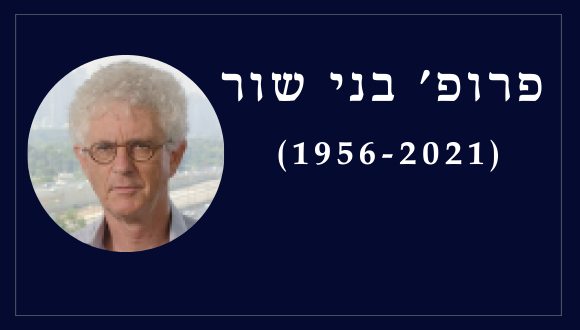פרופ׳ בני שור
לצפייה בכנס לזכרו, 23 בדצמבר 2021 >>
Professor Benny Chor (1956-2021) studied for his undergrad degree in Mathematics (1980) at the Hebrew University, where he also obtained his MSc (1981). He received his PhD in Computer Science at MIT in 1985 for seminal contributions to Cryptography, and for which he got the ACM Distinguished Dissertation Award. He was a postdoc at MIT and Harvard. He accepted a position as professor of Computer Science at the Technion until 1999, and took the position of professor of Computer Science at Tel Aviv University as of 1999 until his tragic passing
Professor Chor was head of the School of Computer Science (2018-2020), and held many other roles on the Tel Aviv University campus including heading of the international academic affairs office and Chair of the PhD committee at the School of Computer Science. He co-founded the MSc program in Bioinformatics and was head of the Bioinformatics undergraduate program. He played a major role in the FILOFOCS project, which strongly supports collaboration between Israeli and French researchers
His academic interests were wide and varied, and included Cryptography and Pseudo-randomness, Computational Biology, as well as Computer Science Education and Teaching. He was a very active member of the academic community and served on many program and professional committees. He produced a great many graduate students, many of whom hold senior academic positions in Israel. Others hold senior positions in industry
Professor Chor's body of work in modern cryptography starting in the early 80's was pivotal to the foundation of the field. His most celebrated contributions include establishing the bit security of RSA encryption, introducing private information retrieval (how to avoid revealing information about the query to a database) in both information theoretic and computational settings, verifiable secret sharing (sharing a secret among potentially dishonest parties and verifying that it was shared correctly), and tracing traitors (used to identify the source of a leak or a pirated set top box). He also made milestone contributions to other areas of the theory of computing, including in the study of randomness extraction, consensus protocols (where he presented the first randomized protocols in shared memory models), and Boolean functions from the perspective of private computation
Benny did seminal work in the field of computational biology, publishing his early work in this field during the mid-1990s. His contributions in bioinformatics include the investigation of universal properties of genome sequences; the analysis of the computational complexity of fundamental problems in understanding species evolution, such as constructing phylogenetic trees; the development of efficient algorithms for genome assembly; and the design of novel methods for the large scale analysis of gene expression
Benny had a great love of teaching; he was admired by his students and won many teaching awards. He had unique dedication to teaching and training young CS and bioinformatics students. He revamped and initiated many of the CS classes and developed massive open online courses (MOOC) as well. Benny was involved in many educational projects and made great efforts towards closing educational gaps in society. He led a project where CS students at Tel Aviv University were part of an outreach program for school pupils. He wrote a book to introduce Life Science students to Computer Science. He translated into Hebrew the project “Computer Science Unplugged” designed to make Fundamental computational notions and ideas accessible to children and the general public
Benny was also an avid outdoorsman, and had a profound love of hiking and sailing, travelling around the world with his family. His sharp wit and unequivocal character will be sorely missed


